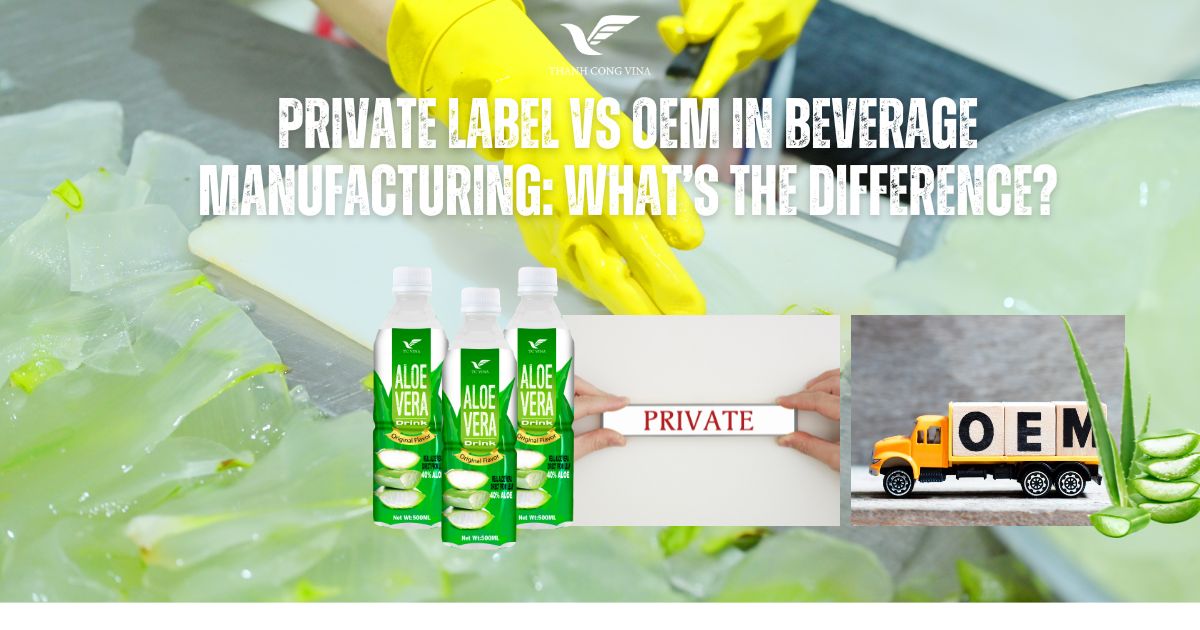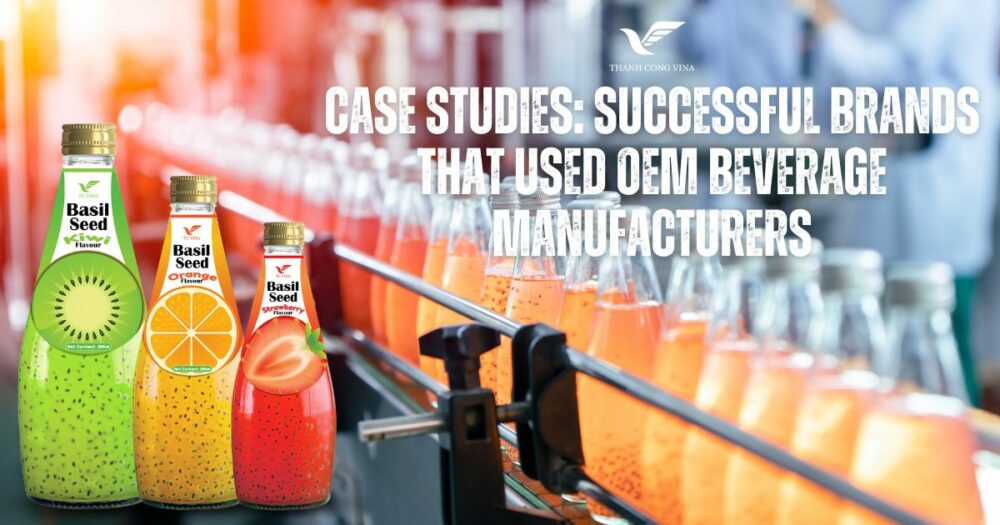In today’s competitive beverage market, companies looking to launch new drinks have two main options for production: Private Label and OEM in Beverage Manufacturing. Both models allow brands to bring products to market efficiently, but they differ significantly in terms of flexibility, cost, control, and innovation. Choosing the right model can determine your success in a crowded global marketplace.
Private label production typically involves selling pre-developed formulations under your own brand name, offering speed and simplicity. In contrast, OEM (Original Equipment Manufacturer) partnerships allow companies to design unique recipes, flavors, and packaging from scratch — ensuring exclusivity and differentiation.
Understanding these differences is essential for entrepreneurs, beverage startups, and established brands aiming to expand their product lines. This article will break down how each model works, their benefits and challenges, and how to decide which approach best suits your long-term business strategy in the beverage industry.
1. Understanding the Basics of Beverage Manufacturing Models
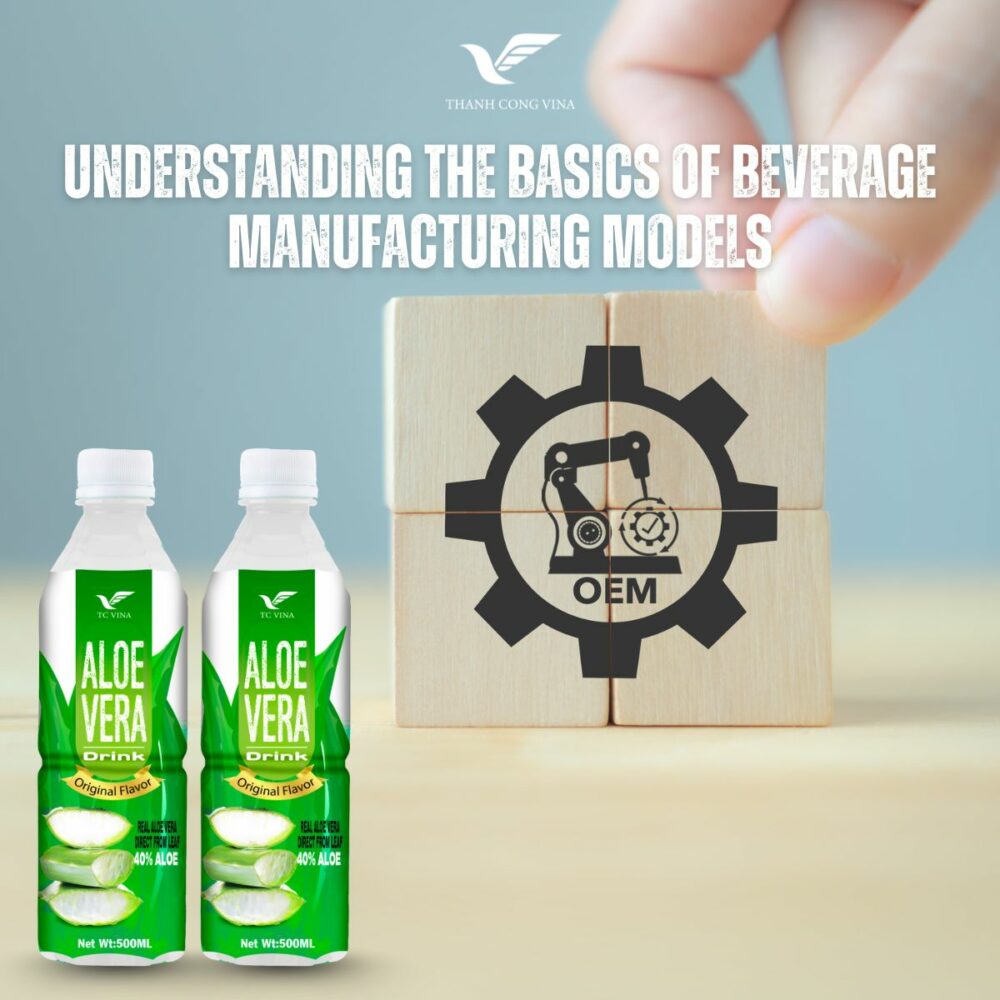
Understanding the Basics of Beverage Manufacturing Models
Before exploring the differences, it’s crucial to understand how OEM in Beverage Manufacturing and private labeling operate within the beverage supply chain. Both involve outsourcing production to a specialized manufacturer, but the level of customization and brand control varies.
In Private Label Manufacturing, the beverage producer develops standard formulations — such as fruit juices, sparkling water, or energy drinks — and offers them to multiple clients who can label and market them under their own brand names. This model is ideal for companies seeking to enter the market quickly without investing heavily in R&D or production facilities.
On the other hand, OEM Beverage Manufacturing refers to a deeper partnership where the client brand provides detailed product concepts, such as specific flavors, functional ingredients, or nutritional profiles. The manufacturer then formulates, produces, and packages the beverage according to those requirements. OEM production offers complete flexibility and uniqueness but requires more collaboration and investment.
Understanding these foundations helps businesses align their goals with the right manufacturing model. If your priority is differentiation and brand identity, OEM is the better option. If speed and cost-efficiency are more important, private labeling may suit you best.
2. What Is Private Label Beverage Manufacturing?
Private labeling is a production strategy where a manufacturer provides ready-made beverage formulations that other brands can market under their own labels. It is a popular choice among retail chains, distributors, and new beverage entrepreneurs who want to enter the market quickly without developing a product from scratch.
Private label beverages often include common product types such as fruit juices, flavored water, energy drinks, or milk-based beverages. Since the formulations are already tested and standardized, brands only need to select from available recipes, packaging designs, and labeling options. This streamlined process significantly reduces time-to-market.
From a cost perspective, private labeling requires lower upfront investment. There’s no need for product development or pilot testing, and minimum order quantities (MOQs) are often more flexible. However, the main drawback is limited customization. Many other brands may sell similar products, leading to reduced exclusivity and potential price competition.
Still, for businesses focused on affordability and rapid market entry, private label beverages are an excellent choice. They allow companies to test markets, build brand awareness, and generate early revenue before investing in full-scale OEM in Beverage Manufacturing partnerships.
3. What Is OEM in Beverage Manufacturing?
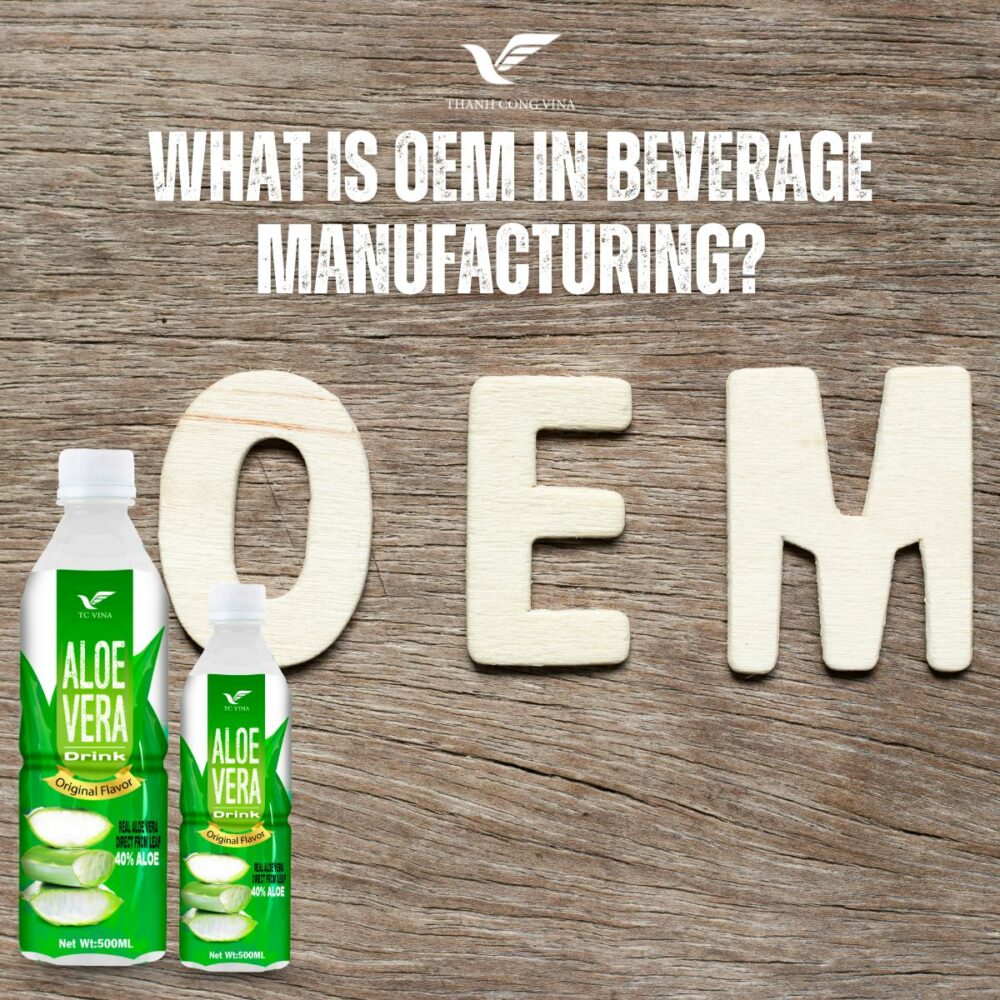
What Is OEM in Beverage Manufacturing?
OEM in Beverage Manufacturing (Original Equipment Manufacturing) is a collaborative model where the manufacturer produces beverages designed and specified entirely by the client. This approach enables companies to create distinctive products that reflect their unique brand identity, flavor vision, and functional purpose.
In an OEM arrangement, the brand typically provides the initial concept — for example, a low-sugar aloe vera drink with vitamin enrichment — and the manufacturer develops the formulation, conducts laboratory testing, and ensures compliance with food safety regulations. The client may also influence bottle design, labeling, and packaging to enhance brand appeal.
OEM manufacturing offers several key advantages:
-
Full customization: Brands can control every aspect, from ingredients to packaging.
-
Innovation opportunity: Ideal for developing new health-focused or premium beverage lines.
-
Global scalability: Manufacturers often have the capacity to export or adapt recipes to meet regional standards.
However, OEM partnerships demand higher investment and closer collaboration. Product development cycles can take months, as testing, stability studies, and certification processes are required. Despite these challenges, OEM production remains the preferred choice for brands that value exclusivity, innovation, and long-term brand building.
4. Key Differences Between Private Label and OEM Beverage Manufacturing
While both models involve outsourcing beverage production, the main differences between Private Label and OEM in Beverage Manufacturing lie in customization, ownership, and control. Below is a breakdown of their key distinctions.
Level of Customization
-
Private Label: Limited to existing recipes and packaging. Brands can only modify labeling and minor aesthetic elements.
-
OEM: Fully customizable — brands can design flavors, functional ingredients, packaging materials, and even processing methods.
Product Ownership and Intellectual Property
-
Private Label: The manufacturer retains ownership of formulations. Multiple clients may sell identical products.
-
OEM: The client owns the final recipe and formulation, ensuring exclusivity and market differentiation.
Time to Market
-
Private Label: Fast turnaround, often within weeks.
-
OEM: Longer development timelines due to testing, approval, and production customization.
Investment Level
-
Private Label: Lower upfront cost, suitable for small businesses.
-
OEM: Requires greater investment in R&D, sampling, and quality assurance.
Branding Opportunities
-
Private Label: Best for retailers or distributors offering multiple beverage lines under their brand.
-
OEM: Perfect for specialized brands that emphasize quality, innovation, and unique consumer experiences.
By understanding these distinctions, beverage companies can make informed decisions aligned with their financial capacity and strategic objectives.
5. The Advantages of OEM in Beverage Manufacturing
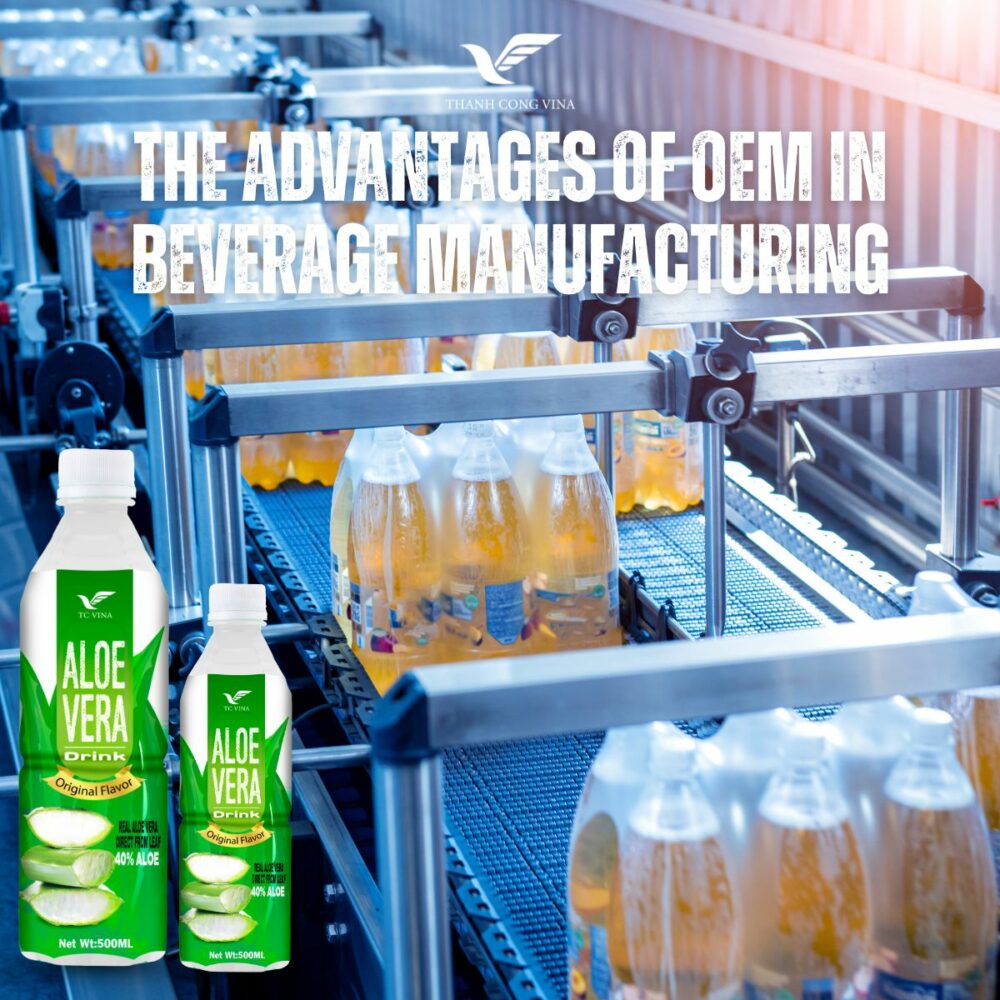
The Advantages of OEM in Beverage Manufacturing
Partnering with an OEM Beverage Manufacturer offers substantial benefits for businesses seeking innovation, scalability, and brand recognition. Here are some of the main advantages that make OEM a strategic choice for long-term success.
Exclusive Product Ownership
Unlike private labeling, OEM manufacturing ensures complete control over the product’s recipe, design, and intellectual property. This exclusivity protects your brand from imitation and allows you to develop a signature beverage line that consumers associate solely with your name.
Flexibility and Innovation
OEM partnerships empower brands to innovate freely — whether by introducing functional ingredients (such as collagen, probiotics, or natural antioxidants) or creating beverages tailored to specific health trends. This flexibility is vital in a dynamic industry where consumer preferences evolve rapidly.
Scalability and Export Potential
Many OEM beverage manufacturers operate with international certifications like ISO, HACCP, HALAL, and FDA, allowing brands to scale globally without worrying about compliance barriers. This makes OEM a suitable option for companies aiming to penetrate export markets or private-label international distributors.
Long-Term Cost Efficiency
Although initial costs are higher, OEM partnerships lead to better long-term profitability. Custom products with strong brand identity command higher retail margins and build consumer loyalty — essential elements for sustainable growth in the beverage market.
6. When to Choose Private Label Over OEM
While OEM manufacturing offers greater control and innovation, private labeling remains a smart choice for certain businesses and circumstances. Here are situations where choosing private label production makes more sense:
Market Testing and Brand Launch
If you are entering a new market or testing consumer response to a beverage concept, private label production allows you to launch quickly with minimal risk. You can gather feedback and refine your strategy before committing to full-scale OEM in Beverage Manufacturing.
Limited Budget or Small Scale
Startups or distributors with limited capital may find private label options more accessible. With lower MOQs and no need for product development, the financial barrier to entry is significantly reduced.
Retail and Supermarket Brands
Large retailers often prefer private labeling to fill their shelves with branded products at competitive prices. Since these products target value-driven consumers, speed and affordability outweigh exclusivity.
Short-Term or Seasonal Campaigns
If your beverage is designed for short-term promotions or limited-edition events, private labeling ensures quick production without the long-term commitment of OEM customization.
Private label production is an ideal gateway for companies building initial brand awareness — and can later evolve into OEM partnerships once the brand achieves market traction.
7. Challenges of OEM in Beverage Manufacturing
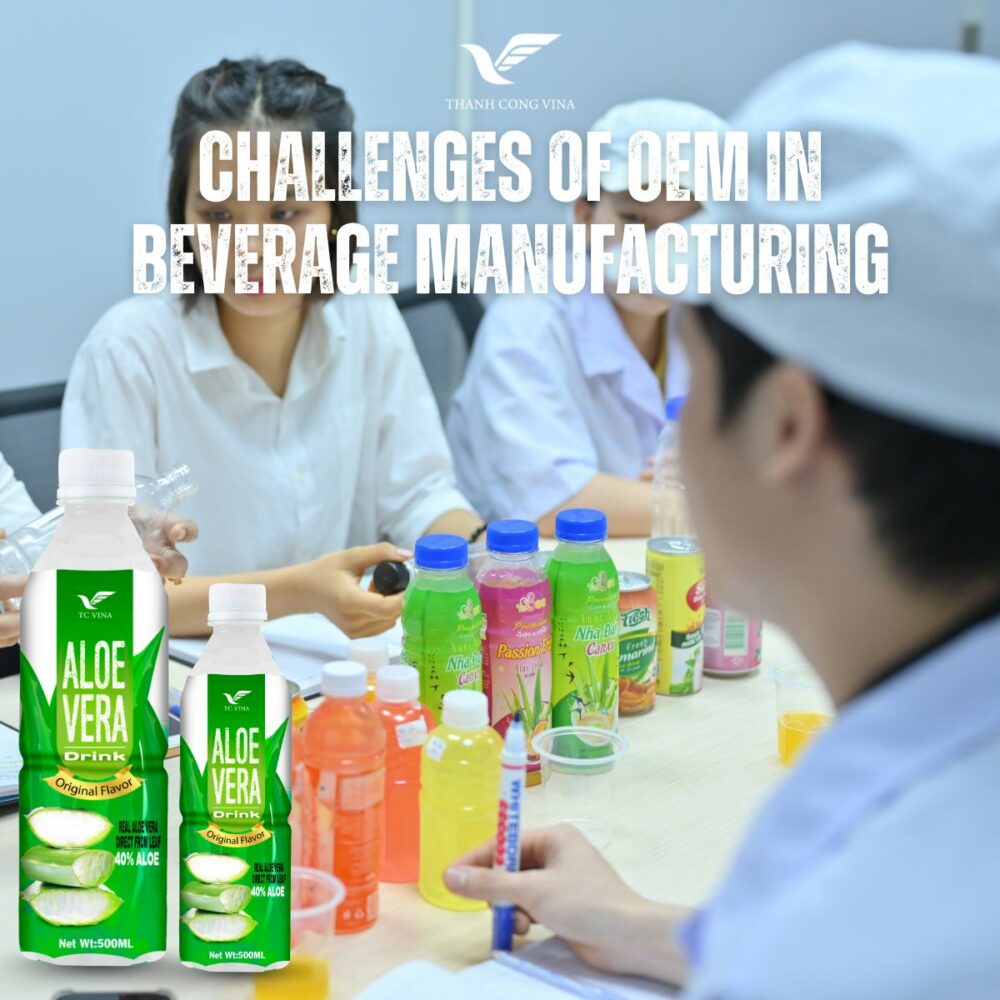
Challenges of OEM in Beverage Manufacturing
While OEM partnerships offer strong advantages, they also come with challenges that businesses must plan for carefully.
Higher Development Costs
OEM manufacturing requires investment in product formulation, testing, certification, and equipment setup. Brands should allocate sufficient budget and time for these processes to ensure high-quality outcomes.
Longer Lead Times
Developing a unique beverage from concept to launch can take several months. This is due to laboratory trials, stability testing, packaging design, and regulatory approvals — all of which ensure compliance and product safety.
Complex Coordination
Because OEM involves multiple stakeholders (R&D, quality control, design, and logistics), efficient communication is vital. Brands should choose a manufacturer with strong project management capabilities and transparent reporting systems.
Regulatory Compliance
Each country has different beverage labeling and formulation regulations. Reliable OEM partners handle compliance, but brands must still stay informed to avoid export or labeling issues.
While these challenges exist, they are outweighed by the long-term benefits of brand differentiation and innovation when working with a trusted OEM beverage manufacturer.
8. How to Choose the Right Beverage Manufacturing Partner
Selecting the right manufacturer is one of the most critical decisions for beverage brand success. Here are key factors to consider when choosing between a private label or OEM in Beverage Manufacturing partner.
Certifications and Quality Standards
Look for manufacturers with global certifications such as ISO 22000, HACCP, HALAL, and FDA. These demonstrate commitment to quality, safety, and international compliance.
Technical Expertise and R&D Support
For OEM production, ensure your partner offers R&D services, lab testing, and pilot production capabilities. A skilled R&D team helps transform your beverage ideas into high-performing commercial products.
Production Capacity and Flexibility
Choose a manufacturer capable of scaling production volumes as your business grows. They should offer both small test batches and large-scale commercial runs.
Transparent Communication
Effective communication prevents misunderstandings during formulation, labeling, or logistics. Regular reporting and real-time updates reflect professionalism and reliability.
Sustainability and Ethical Practices
Consumers increasingly prefer eco-friendly brands. Partner with a manufacturer that follows sustainable practices — from ingredient sourcing to recyclable packaging.
A strong partnership based on trust, transparency, and shared values ensures long-term success, whether you opt for private label or OEM beverage production.
Conclusion
Both private labeling and OEM in Beverage Manufacturing play vital roles in the beverage industry. Choosing between them depends on your brand’s objectives, resources, and vision for growth. Private labeling offers speed, affordability, and simplicity — ideal for quick market entry or budget-conscious startups. In contrast, OEM manufacturing provides full customization, exclusivity, and innovation, perfect for brands seeking long-term differentiation and international expansion.
At Thanh Cong Vina Beverage, we specialize in both OEM and private label beverage production, offering global partners comprehensive solutions for every stage — from formulation to packaging. With modern facilities, certified processes, and a dedicated R&D team, Thanh Cong Vina ensures your beverage products meet international standards of quality, safety, and taste. Whether you’re launching a new drink or expanding into new markets, our OEM expertise helps transform your vision into successful, world-class beverages that consumers trust and love.

